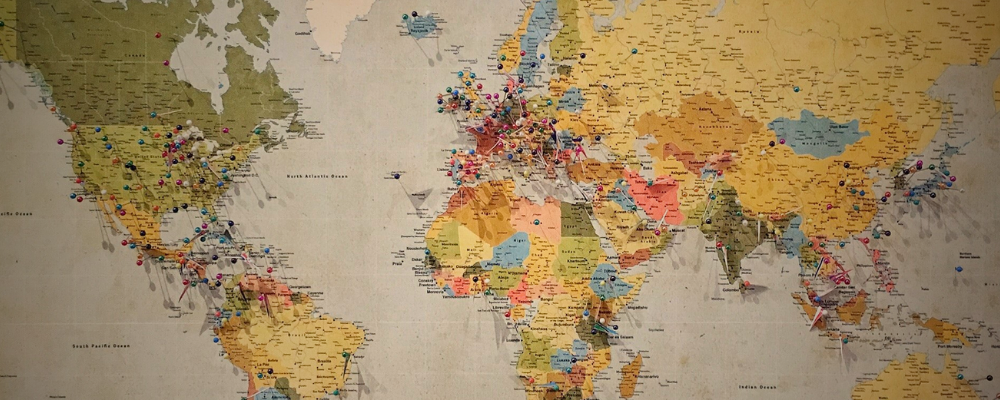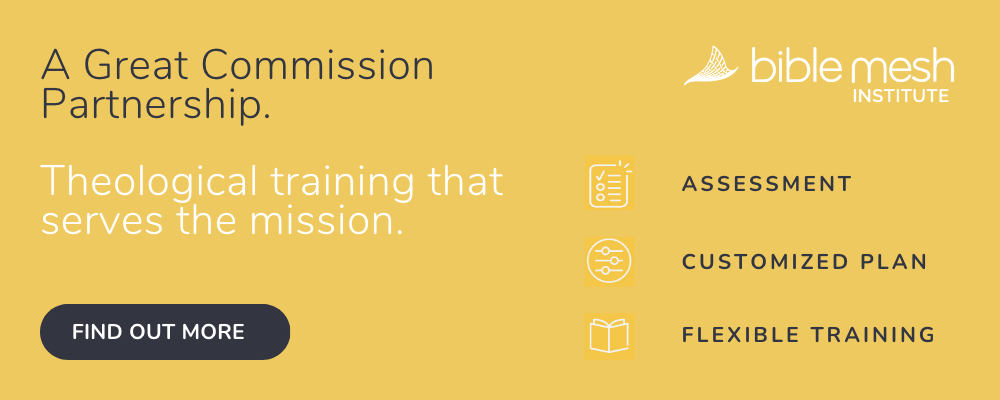In this series of blog posts, Dean of the BibleMesh Institute Dennis Greeson explores questions related to theological education and training for cross-cultural ministry. The questions and answers have been adapted from a Global Missions Podcast episode.
In this series, Dr. Greeson considers how to define the nature and task of theological education, especially for missionaries, considers common barriers to theological education, and looks at trends in how models for theological education are becoming more innovative and effective in preparing missionaries to join God’s work around the world.
Q. What kind of advice do you give to folks who are looking for theological education and are concerned about trustworthiness?
When we think about trustworthiness, I think that there is still a great need for accountability and quality assurance in theological education, and one way this is ensured is through accreditation. I encourage people to look for an accredited institution.
Having a degree in hand from somewhere doesn’t always mean what people may think it means. An organization could create a degree and award it without being accredited. One may receive a certificate, thus providing the credentials to go somewhere, without having learned the competencies and skills ordinarily associated with a degree.
There are a million online schools where one can get that kind of certificate. Quality accrediting bodies exist to ensure that when someone walks out with a degree, we can generally trust that this is proof that that student possesses the skills and competencies signified by that degree.
With that said, however, I would also encourage people to think in terms of what someone ought to learn rather than in terms of credentials. In a previous post, I mentioned the four essential pillars of theological formation. The key is to ask what ought your classes prepare you to do and demonstrate.
If you’re a missions committee member without formal seminary training, that question may be daunting. You may not know exactly what it would take for someone to be an effective missionary. But at the very least, you can think in terms of whether they understand the gospel. Can they articulate it? Can they disciple others in it? Those are the types of competencies BibleMesh thinks through. Whatever training program a missionary candidate enrolls in, it should equip them to do those things.
People should look for a training organizations or institution that allows not just the learner, but the church or the network to be a stakeholder in the process.
When it comes to beliefs, statements of faith and seeing who organizations partner with are crucial for determining whether you can trust the organization.
For instance, not only does BibleMesh partner with specific schools, we also develop the content we teach in our courses from publishers that print textbooks for evangelical seminaries. We partner with organizations we can trust and we want to put those names out there to be open and honest about what we teach.
Finally, people should look for a training organizations or institution that allows not just the learner, but the church or the network to be a stakeholder in the process. The mission agency or sending church committee should have a say in the content a candidate is learning and demonstrating through their coursework.
BibleMesh does this by drawing up syllabi for all of its courses, outlining our outcomes and what a person will and be required to demonstrate. We then give organizations that are sending us individuals the opportunity to review those and speak into the process.
For example, one of our partners, Christar. has spoken into the learning process and helped shape the individual classes that we teach the students they send. Openness, transparency, and a willingness to invite into and involve in the process those who are sending the missionaries is crucial.
Q. What Are the Three Key Idea’s that Drive BibleMesh?
BibleMesh is about three “greats.” First and foremost, we are about the Great Commandment.
Jesus tells us to love God and love our neighbors (Matthew 22:37–40). There’s nothing above that. The whole law is encapsulated by it. From start to finish, we want the commitment to love the Lord with all that we are and love our neighbors well to dictate what it means to learn to be a theological learner and an educator.
The second is the Great Commission. Throughout redemptive history God has been about a global mission and he calls his church directly into that. We want to teach Hebrew, Greek, Old and New Testament, ethics, and philosophy all under the frame and in the direction of serving that mission.
Great Tradition. Great Commission. Great Commandment. These three “greats” shape everything BibleMesh does.
The third great is the Great Tradition. We want to learn from those who have gone before. We want to benefit from the wisdom of the church through the centuries. That doesn’t mean that the church or specific Christians throughout history have always been correct, but there is a stream of tradition dating back to the early church that ought to inform how one thinks and does theology today.
If I presume that I can effectively read the Bible while sitting in a closet with a flashlight, isolated from the local church, mentors, pastors, and the faithful saints who have wrestled with the doctrine of the Trinity or how to evangelize to Muslims in the eighth and ninth century, I put myself in a dangerous position. We want to directly tie everything we do to the Great Tradition, not presume there is nothing to learn from the great cloud of witnesses surrounding us (Hebrews 12:1).
Church history is not directly taught in every BibleMesh course. But our students are steeped in the ecumenical councils and the creeds that come out of them. We steep our students with a historical awareness from biblical interpretation to the theological task. Great Tradition. Great Commission. Great Commandment. These three “greats” shape everything BibleMesh does.
This ends part 3 of our four part series on How Should Missionaries and Mission Agencies Think About Theological Education?
Dr. Dennis Greeson is Dean of the BibleMesh Institute and Research Fellow in Public Theology for The Land Center for Cultural Engagement. He is also a PhD Research supervisor at Union Theological College, Belfast, and teaches and writes on theology, culture, and public square issues.

